Podcast Topic: Climate Change, Environment & Food
The Leading Voices in Food
Podcast Topic: Climate Change, Environment & Food
 E206: Results from a National Household Food Waste Survey
E206: Results from a National Household Food Waste Survey
June 6, 2023
No one actually wants to waste food, right? And yet, a new national study on food waste at home shows we’ve become more wasteful recently. US families self-reported a 280% increase in discarded food between early 2021 and early 2022. What’s more, households tossed out more food during weeks they ate out. Today, we will explore results from a national tracking study published in the Journal of the Agricultural and Applied Economics Association. Our guests to help us learn more about this topic are economist Kathryn Bender. Katherine studies consumer behavior and food waste at the University of Delaware. We also have Brian Roe, who is an agricultural economist from the Ohio State University. Brian’s research focuses on food waste and consumer economics.
Related podcasts: Climate Change, Environment & Food | Food Waste & Implications | Food, Psychology & Neuroscience |
 E199: How USAID is working to reduce wasted food in developing countries
E199: How USAID is working to reduce wasted food in developing countries
March 14, 2023
Today we’re looking at food waste and loss on an international scale. Did you know that over 1/3 of the world’s food is lost or wasted? In low- and middle-income countries, over 40% of food loss occurs before a crop even makes it to the market. This food loss undermines efforts to end hunger and malnutrition. Wasted food contributes 8 to 10% of global greenhouse gas emissions. Addressing this challenge is critical to global food security, nutrition, and climate change mitigation.
Related podcasts: Agriculture & Tech | Climate Change, Environment & Food | Food Insecurity | Food Policy | Food Waste & Implications |
 E195: How USDA is tackling food waste and loss
E195: How USDA is tackling food waste and loss
February 1, 2023
In the United States, over one third of all available food goes uneaten through loss or waste. That is a hard number to ignore when more than 10% of the US population is food insecure. What’s more, uneaten food is the single largest category of material sent to landfills. So what is the USDA doing to address food loss and waste? Our guest today is Dr. Jean Buzby, the Food Loss and Waste Liaison in the US Department of Agriculture’s Office of the Chief Economist.
Related podcasts: Climate Change, Environment & Food | Food Policy | Food Waste & Implications |
 E193: Challenges and opportunities: turning food waste into valuable products
E193: Challenges and opportunities: turning food waste into valuable products
January 17, 2023
According to the Environmental Protection Agency, food is the single largest category of material sent to landfills in the US, where it emits the greenhouse gas methane. It would be a win for climate if food waste could instead be transformed into commercially valuable products. Today, we’re talking with two researchers who are working out the feasibility of just that. Welcome to the Leading Voices in Food podcast. Our guests for today are sustainability and energy science researcher Thomas Trabold of the Golisano Institute for Sustainability at Rochester Institute of Technology. And second, we have food science and technology researcher Ned Spang from the University of California Davis Food Loss and Waste Collaborative.
Related podcasts: Climate Change, Environment & Food | Food Policy | Food Waste & Implications |
 E188: Can we achieve sustainable management of food waste?
E188: Can we achieve sustainable management of food waste?
November 28, 2022
When you hear the words food waste do you think about forgotten leftovers? In the journey from farm to stores to the dinner table, some food is lost during the processing and transportation and at home some purchase food simply goes uneaten. How can transportation science help reduce food waste and loss and make the food system more resilient and climate friendly?
Related podcasts: Agriculture & Tech | Climate Change, Environment & Food | Food Waste & Implications |
 E185: How and why do households waste food?
E185: How and why do households waste food?
November 2, 2022
Did you know that each year the average American family of four loses $1,500 to uneaten food? What’s more, consumer food waste is the largest category of waste sent to landfills. When food is wasted, so is the land, water, labor, and energy that were used in producing, processing, transporting, preparing, storing and disposing of the discarded food. So why does household food waste and plate waste happen? We have two guests today to help us explore this topic. First, Dr. Roni Neff from Johns Hopkins University. Roni studies wasted food, food system resilience, and climate change through a public health lens. Second, we have Dr. Brian Roe from the Ohio State University. Brian focuses on food waste and behavioral and consumer economics.
Related podcasts: Climate Change, Environment & Food | Food Waste & Implications | Food, Psychology & Neuroscience |
 E179: Investing in Soil Regeneration for Human Health & Environmental Health
E179: Investing in Soil Regeneration for Human Health & Environmental Health
August 31, 2022
Today, we’re speaking with geologist David Montgomery, co-author with Anne Bikle, of a new book called “What Your Food Ate.” Very interesting title. David is professor in the College of the Environment at the University of Washington and earlier had been awarded a MacArthur fellowship. You may already be familiar with him through his acclaimed book called “Dirt: The Erosion of Civilizations.” Dr. Montgomery has long argued that the root of good health begins with dirt, a factor that we ignore at our peril.
Related podcasts: Agriculture & Tech | Climate Change, Environment & Food | Regenerative Agriculture |
 E178: A Call to Invest in Agriculture’s Missing Middle
E178: A Call to Invest in Agriculture’s Missing Middle
August 24, 2022
We’ve done many podcasts on the topic of regenerative agriculture, which is a conservation and rehabilitation approach to farming and ranching that enriches and restores the environment while also producing more nutrient dense food. Today, we are speaking with Anna Aspenson of the Croatan Institute about the need for financial investment in regional food production, and processing infrastructure, such as meat packing, grain milling and malting and produce canning, or even freezing facilities.
Related podcasts: Agriculture & Tech | Climate Change, Environment & Food | Community & Economic Development | Regenerative Agriculture |
 E174: Down to Earth with NC Farm Bureau’s Shawn Harding
E174: Down to Earth with NC Farm Bureau’s Shawn Harding
July 7, 2022
Today, we’re talking with the President of North Carolina Farm Bureau, Shawn Harding. Farm Bureau is the state’s largest farming organization and is often referred to as the voice of North Carolina agriculture. In this interview, we’ll explore the diverse ways this vital association supports North Carolina farmers and growers. I might also say that there are Farm Bureaus in all 50 states, and from what I understand, North Carolina is one of the largest. So it’s a special pleasure to have Shawn with us.
Related podcasts: Agriculture & Tech | Climate Change, Environment & Food | Community & Economic Development | Food Policy | North Carolina | Voice of Farming |
 E171: Vertical Farming in Qatar – Promise & Challenges
E171: Vertical Farming in Qatar – Promise & Challenges
June 16, 2022
Today, we’re exploring an agricultural innovation in the state of Qatar in Western Asia. Qatar is a wealthy, densely populated country located on the Northeast coast of the Arabian peninsula and leads the world in liquified natural gas exports. But the country’s desert climate is harsh and the agriculture there is challenging. That’s where shipping containers, artificial light and vertical farming techniques come into play. Our guest today is horticulturalist Mohamed Hassouna from the Qur-anic Botanic Garden in Qatar. He and his partners at the University of Arizona are developing a shipping container vertical farming model as a way to expand local food production.
Related podcasts: Agriculture & Tech | Climate Change, Environment & Food | Urban Agriculture |

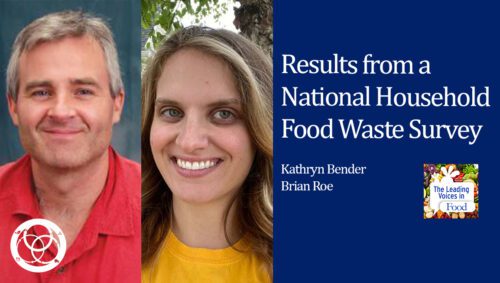 E206: Results from a National Household Food Waste Survey
E206: Results from a National Household Food Waste Survey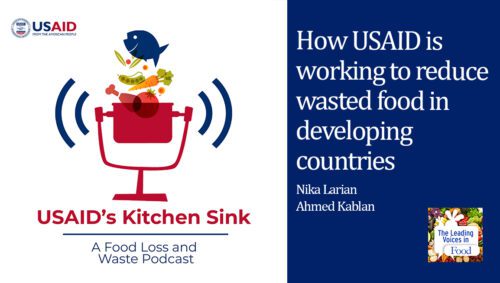 E199: How USAID is working to reduce wasted food in developing countries
E199: How USAID is working to reduce wasted food in developing countries E195: How USDA is tackling food waste and loss
E195: How USDA is tackling food waste and loss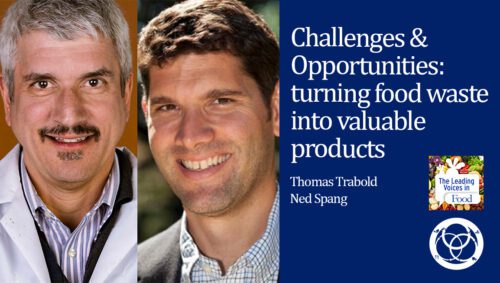 E193: Challenges and opportunities: turning food waste into valuable products
E193: Challenges and opportunities: turning food waste into valuable products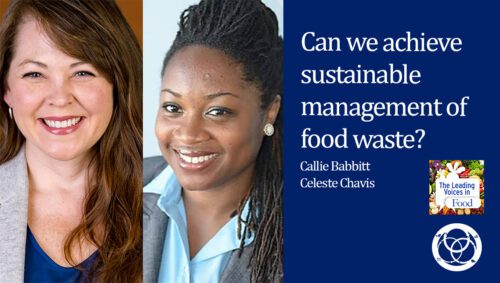 E188: Can we achieve sustainable management of food waste?
E188: Can we achieve sustainable management of food waste?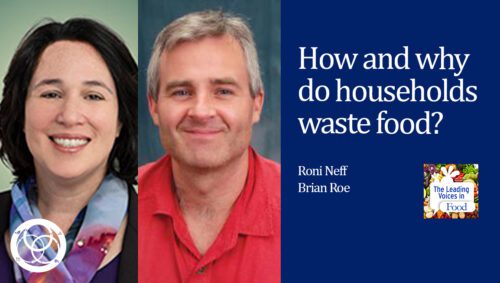 E185: How and why do households waste food?
E185: How and why do households waste food?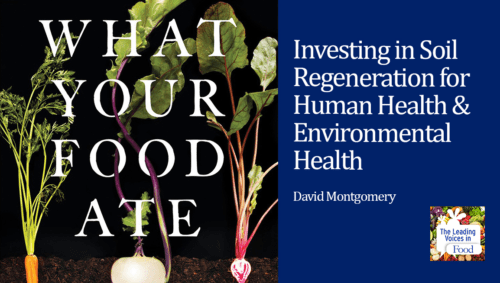 E179: Investing in Soil Regeneration for Human Health & Environmental Health
E179: Investing in Soil Regeneration for Human Health & Environmental Health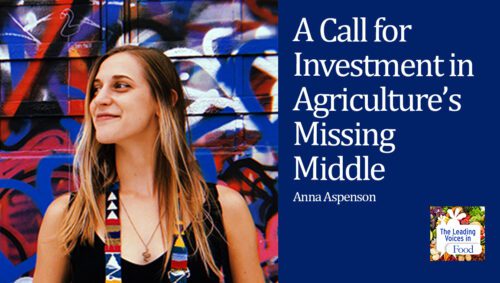 E178: A Call to Invest in Agriculture’s Missing Middle
E178: A Call to Invest in Agriculture’s Missing Middle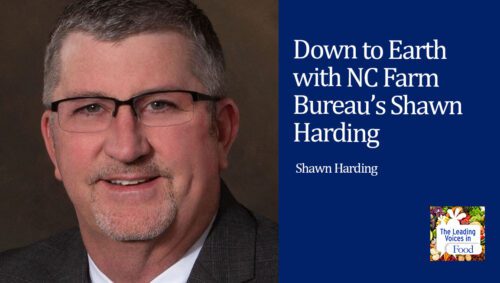 E174: Down to Earth with NC Farm Bureau’s Shawn Harding
E174: Down to Earth with NC Farm Bureau’s Shawn Harding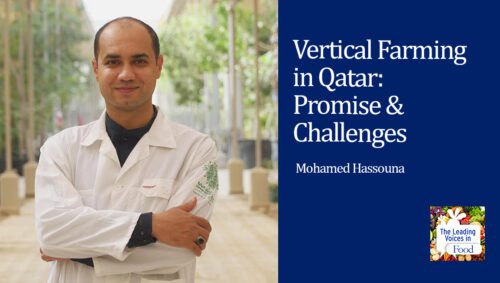 E171: Vertical Farming in Qatar – Promise & Challenges
E171: Vertical Farming in Qatar – Promise & Challenges